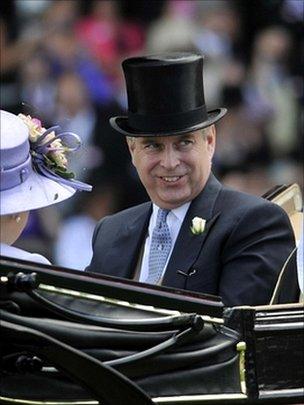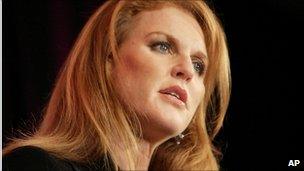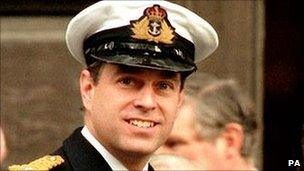Prince Andrew: Envoy career plagued with controversy
- Published

Prince Andrew attracted much criticism, but his private secretary said it was "without foundation"
The Duke of York is to step down as the UK trade envoy, the BBC understands, ending a controversial period in the role.
Prince Andrew's suitability as the UK special representative for trade and investment has been criticised throughout his ten years in the role.
Most recently - in March 2011 - he came in for a steady stream of criticism over his friendship with US tycoon Jeffrey Epstein, who was jailed for sex offences. There were even calls for him to step down then.
But it was not the first time questions were raised about Prince Andrew's judgement.
Questions have been raised over the prince's suitability by such issues as lunching at Buckingham Palace with a "notorious" member of the former Tunisian regime, to taking a holiday with a Libyan gun smuggler, to claims he used an official trip to try to find a buyer for his home in the UK.
Eyebrows have also been raised in some quarters about the prince' diplomacy style. One ambassador described him speaking "cockily" and "verging on rude".
And he was not unscathed by the financial scandal surrounding his ex-wife Sarah Ferguson, after she was recorded in 2010 offering to sell access to Prince Andrew to a reporter posing as a businessman.
His private secretary said at the time that the "insinuations and innuendos" surrounding the duke were "without foundation."
Prince Andrew, the Duke of York, was appointed the UK's Special Representative for International Trade and Investment in 2001 after retiring from the Royal Navy.
He worked for - but did not receive a salary from - the government body UK Trade & Investment (UKTI), which reports jointly to the Foreign Office and the Department for Business, Innovation and Skills.
UKTI describes the role as "promoting UK business internationally, marketing the UK to potential inward investors, and building relationships in support of UK business interests".
Before his expected departure in July 2011, it said: "The duke's unique position gives him unrivalled access to members of royal families, heads of state, government ministers and chief executives of companies".
The role took him on expenses-paid delegations all over the world, and comments about his expenditure - including his use of helicopters - caused some newspapers to nickname him "Airmiles Andy".
Over the years journalists have remarked on how some of Prince Andrew's trips abroad, supposedly on government business, seemed to go via ski slopes, top golf courses and other exotic locations.
According to his website, in 2009 the prince undertook some 757 public engagements in the UK and overseas, 550 of which were related to his trade role.
The prince's connections have not been welcomed by everyone however.
Labour MP Chris Bryant, speaking earlier this year as Britain took military action against Libya, said it was becoming "increasingly difficult to explain the behaviour of the UK Trade & Investment special trade ambassador, who is not only a very close friend of [Libyan leader Colonel Gaddafi's son] Saif Gaddafi but a close friend of the convicted Libyan gun smuggler Tarek Kaituni.
"Is it not time that we dispensed with the services of the Duke of York?"
Prime Minister David Cameron responded at the time that he would look into those connections, but added: "If we are to disqualify friends of Saif Gaddafi from public life, I think that he [Mr Bryant] will be saying goodbye to one or two of his old friends."
Prince Andrew helped Andrew Sunnucks from Audio Networks make a business deal with Google
His friendship with Mr Epstein caused huge controversy.
The pair were photographed meeting in December, after the tycoon had served an 18-month prison sentence for soliciting a minor for prostitution.
Prince Andrew had visited Epstein at his Florida home over the years, and newspapers have published photographs of him with Virginia Roberts, then 17, who has claimed that from the age of 15 she was sexually exploited by Epstein. Other women have also lodged claims against Epstein.
There is no suggestion Prince Andrew was involved in sexual contact with any of those making claims against Epstein. The prince has also reportedly vowed to have cut all ties with him.
After several days of newspaper reports on the Epstein connection, Prince Andrew was hit with a further blow. Sarah Ferguson admitted having accepted £15,000 from Epstein, to help pay off her debts.
Following a story in the Daily Mail that Epstein paid the money directly to her former personal assistant, Johnny O’Sullivan, external, the duchess gave an interview to the London Evening Standard, in which she admitted to a "gigantic error"., external
Mr O'Sullivan had been claiming £78,000 from the duchess, who was mired in debt, for unpaid wages and other bills.
Promising to repay the money received from Epstein, she added that she was "distraught" her mistake had "compounded and rebounded and also inadvertently impacted on the man I admire most in the world, the duke".
Also defending the prince, his private secretary wrote to the Times to address the "widespread comment" on his relationship with Epstein.
He said the Duke of York had known the businessman since being introduced to him in the early 1990s. He added: "The insinuations and innuendos that have been made in relation to the duke are without foundation."
On the duke's relationship with Sakher al-Materi, a leading member of the former Tunisian regime who was entertained at Buckingham Palace, one ambassador said Mr Materi was known as "notorious".
Stephen Day, a former British ambassador to Tunisia, told BBC Radio 4's Today programme: "I advised my clients to go nowhere near him."
Agreeing with the assertion that Mr Materi was a "crook", he added that he was "the worst of all of them".
Mr Materi fled the north African country after the uprising in January and is currently under investigation for money laundering.

The Duchess of York has admitted taking money from Epstein was an "error"
Referring to the lunch at the palace, Mr Day commented: "I cannot imagine how that happened. I think the embassy in Tunis were very clear that this was a man who carried an awful lot of baggage."
A spokesman for Prince Andrew defended the duke's actions, saying: "Whatever has happened since, at the time it was a legitimate public engagement."
Spoke 'cockily'
The prince' s relations with Timor Kulibayev, the son-in-law of the President of Kazakhstan, have also previously been questioned. Mr Kulibayev purchased the duke's Sunninghill Park home for £3m more than its £12m asking price in 2007.
The Daily Mail quoted Buckingham Palace as saying the sale did "not commit the prince to any other commercial arrangement".
And in November 2010 a cable published on Wikileaks revealed a US ambassador wrote in a secret cable that the Duke of York spoke "cockily" during an official engagement, leading a discussion that "verged on the rude".
Tatiana Gfoeller, Washington's ambassador to Kyrgyzstan, also said Prince Andrew had criticised the Serious Fraud Office probe of an arms deal between BAE and Saudi Arabia, and accused Guardian journalists of "poking their noses everywhere" for investigating the deal.
Ms Gfoeller said Prince Andrew told her that the UK, Western Europe and the US were now "back in the thick of playing the Great Game" - a reference to the 19th Century struggle between the British and Russian Empires for control of Central Asia.
"More animated than ever, he stated cockily 'and this time we aim to win'," she wrote.
Following the Wikileaks revelations, Simon Wilson - Britain's deputy head of mission in Bahrain from 2001 to 2005 - wrote in the Daily Mail that Prince Andrew was "more commonly known among the British diplomatic community in the Gulf as HBH: His Buffoon Highness".

Prince Andrew previously had a career in the Royal Navy
He remarked on some of the prince's demands and the size of his entourage - which has also attracted criticism from a number of quarters.
"Officially, he doesn't get paid for the role, but the style in which I observed him carrying it out beggared belief. He travelled with a team of six, including equerries, private secretaries, protection officers and a valet.
"There was also a 6ft-long ironing board that he insisted went everywhere he went. It was hilarious to witness the valet struggling off the plane with it and placing the precious object carefully into the minibus."
He said the prince often went against the official brief in business meetings, but that people were afraid to point it out.
"There has to be a question mark over the value for money that British taxpayers get out of HBH's trips abroad," he said.
"But the main issue has to be the prince's ploughing of his own furrow and the reluctance of senior officials to point this out."
- Published7 March 2011
- Published1 March 2011
- Published30 November 2010
- Published4 March 2011